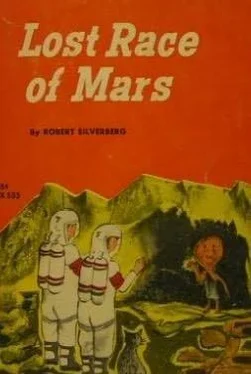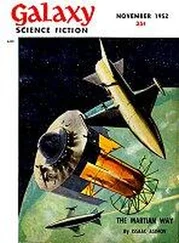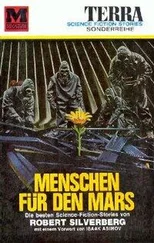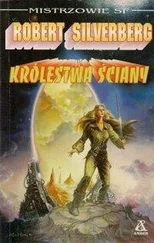The air lock men checked the breathing suits and then opened the lock, one door at a time.
Jim carefully steered the motorsled through the lock and brought it to a halt just outside the dome.
He looked back. The attendants had closed the inner lock and had gone about their business.
“I guess it’s safe,” Jim said.
“I’m scared,” Sally put in. “I wonder—maybe we shouldn’t be doing this.”
“It’s a fine time to think about backing out! As long as we’ve gone this far we might as well explore a little.”
“But suppose the sled breaks down? Or we might get lost.”
“If the sled breaks down,” Jim assured her, “we can radio the colony over our suit radios. And we won’t get lost. See the compass on the dashboard? All we have to do is keep track of which way we go, and we can find our way back without any trouble.”
“All right,” Sally agreed, but she still sounded nervous. “Let’s start, then. Which direction are we going?”
“We’ll go south, toward Xanthe, I think. That’s the area where Mitten was found.” Jim punched the starter button and the motorsled rumbled to life. It rolled slowly away from the dome. Jim let it pick up speed.
Driving the sled was much safer than driving an automobile would be on Earth. There were no other cars to watch out for because the desert was empty. Jim didn’t even have to worry about staying on the road because there wasn’t any road—just flat, smooth-packed desert, stretching as far as the eye could see, broken only by widely scattered outcroppings of rock which ended where the rich blue of the sky began.
The day was fairly warm and the sun was bright. It was summer in this part of Mars, a summer that would last nearly half an Earth year. During the Martian summer the daytime temperature usually got as warm as fifty or sixty degrees. At night in the summertime the thermometer generally registered zero to ten degrees on the desert. Real winter never came to this region of Mars because it was on the equator, but near the poles the temperature frequently dropped as low as a hundred degrees below zero, and even lower in the dead of winter.
When the dashboard mileage counter told Jim that he was about ten miles from the colony, he began to search for caves. He had already found out that most of the known caves were near cliffs, so he skirted along the base of every rock formation they came to, looking for a cave entrance. They found none.
An hour went by. They were a considerable distance from the colony. Everywhere, their eyes met only barren sand, multicolored rocks, and bizarre desert plants.
“Maybe we should just turn back,” Sally suggested. “We’re just on a wild-goose chase. It was silly to think we were ever going to find new caves.”
“This trip was your idea,” Jim told her firmly. “But we might as well have a look around, now that we’re out here. We’ll keep going till noon, then turn around and go back. We’ll be home in time for lunch.”
They had not brought food because it was impossible to eat without opening their helmets, and in an unsheltered sled they could not do that. Jim drove on. A little while later they saw the first sign of life all morning—a desert rat the same color as the sand. It bounded in front of the sled and vanished.
Shortly afterward they passed a sand tortoise. The tortoise had been patiently plodding through the desert and was so startled by the approach of the sled that he forgot to pull in his head. Jim caught a glimpse of the three-eyed creature as they zoomed past.
After that, everything was motionless. Mitten sat patiently in Sally’s lap, seemingly asleep, but keeping his large eyes open and alert. Jim was becoming very tired of this expedition. His eyes hurt from staring at the sun-brightened sand, and driving the sled was hard, too. It was eleven-thirty. They had been wandering in the desert almost an hour and a half. The colony was forty miles behind them.
“I’m just about ready to give up,” Jim confessed. “There’s no sense wandering around any more. I don’t know which one of us is dumber—you for thinking up this trip, or me for letting myself be talked into taking it with you.”
“Dad would be furious if he knew!” Sally said. “Well, it seemed like a good idea before we left. I guess I expected the Old Martians to stick up a flag or something and say, ‘Here we are!’ ”
“Let’s turn around and go back, then.”
“Okay.”
Jim began to turn the sled. Suddenly Sally pointed toward the west and said, “Look at that big cloud.”
“There aren’t any clouds in the desert, Sally. There isn’t enough water vapor here to make a decent cloud.”
“I tell you there’s a cloud out there,” Sally insisted. “Look for yourself!”
Jim glanced over his shoulder, squinting a little. Sure enough, there was a cloud out there, and a big one, too. It was not fleecy white, like the clouds of Earth, but yellow. And it kept growing bigger. It looked like a tremendous yellow splotch of paint rapidly spreading over the deep blue backdrop of the sky.
“What on Mars could that be?” he wondered out loud. “I remember hearing something about yellow clouds—oh, oh!” He gasped. “Now I remember. Sally, it’s a sandstorm!”
“No! What are we going to do? Can you outrace it with the sled?”
“Not a chance. They only thing to do when you get into a sandstorm is to huddle down and let it pass over you. Golly, we have all the rotten luck!”
“How soon will it be here?”
“Any minute, looks like,” Jim said, peering toward the horizon. The storm was approaching rapidly. Already the advance gusts of wind were beginning to slow around the sled, kicking up dancing swirls of sand. Soon, the entire raging mass of the storm would pass over them driving tons of sand onward toward the east.
Stopping the sled, Jim swiveled his chair around so it faced Sally. They were partly screen by the windshield of the sled, and Jim hoped that their suits would give them the protection they would need. They huddled together, Jim wrapping his arms around Sally’s shoulders. The way Jim and Sally were sitting, Mitten was almost entirely sheltered by their bodies.
“Maybe it’ll miss us,” Sally said.
“I doubt it. It looks like we’ll be smack in the middle of it.”
The earphones of their suits picked up the wild howling of the onrushing winds. The air was thick with sand now, leaping about wildly as the storm grew nearer.
“Here it comes!” Jim cried.
A solid wall of sand swept toward them in the air.
And then the storm hit them in all its fierce power. It smashed against the windshield, and the sled rocked with the impact. Jim and Sally clung tightly to each other. The sound of the storm roared in their ears. They felt the sand particles striking their suits with terrific force. It felt as if they were being pelted with thousands of tiny pebbles.
Cascades of sand continued to sweep down on them, pounding on the windshield, rattling against their suits. Once, Jim lifted his head, but he could see nothing. It was like being at the bottom of a sea. Sand was everywhere, all around them, sweeping over the sled, half burying them. The sled was moving, blown over the desert. It had turned completely around, and the windshield, instead of providing a barrier against the sand, now made it easier for the wind and sand to push the sled along.
Holding tight to Sally, with Mitten still huddled between them, Jim wondered how much longer this could go on. What if they were buried twenty feet under the dunes? If the sled were ruined? If -
There was suddenly no longer any need to wonder about possibilities. As swiftly as it had overtaken them, the storm was gone. The air was clear; the wind no longer roared, but merely sang and whistled.
Читать дальше












